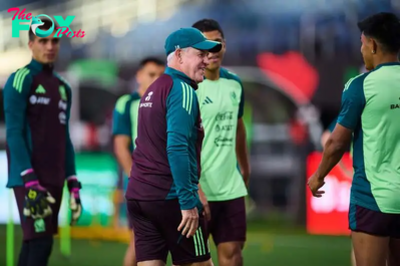Football
Explaining FIFA Council's calls on Israel-Palestine, women's Olympic soccer, Club World Cup rosters
The FIFA Council met on Thursday at the governing body's headquarters in Zurich to address a wide range of topics, including a request to ban the Israel Football Association, the women's Olympics soccer tournament, and the upcoming expanded men's Club World Cup.
Thursday's announcements covered a series of lingering, high-profile questions but were a mix of decisive action and notable recommendations in evolving situations. The FIFA Council's most definitive choices delivered new roster rules for the 2025 Club World Cup hosted by the U.S., though several issues remain unaddressed on both the upcoming tournament and other topics on the agenda in Zurich.
Here's an explainer on the latest moves from the FIFA Council.
FIFA mandates investigations into Israel
The FIFA Council tasked the governing body's disciplinary committee and governance, audit and compliance committee with investigations focused on the Israel Football Association (IFA), delaying a decision on a request from the Palestinian Football Association (PFA) to suspend the IFA.
The PFA made the request in May at the annual FIFA Congress in the wake of the Israel-Hamas war that began in October 2023, though this was not the first time the PFA made the suggestion. FIFA, at the time, opted to seek independent legal advice before making any decisions but put the PFA's request on the agenda for Thursday's meeting in Zurich and opened up two investigations before making any decisions.
The disciplinary committee will look into the PFA's accusation of discrimination by the IFA, while the other committee will investigate and advise the FIFA Council on the claim about Israeli teams functioning in land that belongs to Palestine.
"The FIFA Council has implemented due diligence on this very sensitive matter and, based on a thorough assessment, we have followed the advice of the independent experts," FIFA president Gianni Infantino said in a statement. "The ongoing violence in the region confirms that, above all considerations, and as stated at the 74th FIFA Congress, we need peace. As we remain extremely shocked by what is happening, and our thoughts are with those who are suffering, we urge all parties to restore peace to the region with immediate effect."
Disputes between the PFA and the IFA have been on FIFA's radar as long ago as 2015, when the FIFA Congress established a monitoring committee focused on conflicts between Israel and Palestine. The issue of sanctioned Israeli teams and competitions in the occupied West Bank was on FIFA's radar in 2017, when the governing body "closed" the matter. A Human Rights Watch report in 2020, though, said that six teams in Israel's lower leagues were based in the occupied West Bank.
FIFA has issued no timeline on the completion of either investigation, nor has it set a date for a decision on the PFA's request to suspend the IFA.
Club World Cup roster update
FIFA will sanction a unique transfer window for the summer of 2025 to account for the Club World Cup, which will cause disruptions to teams' usual cadence of signing new players for the season ahead.
Member associations have the option of opening an "exceptional registration window" from June 1 to June 10, weeks before the usual window opens on July 1, to accommodate clubs participating in the Club World Cup. The 32 teams at the summer tournament will also be able to register new players midway through the tournament during a "restricted in-comPetition period" from June 27 to July 3 to accommodate for player contracts that expire on June 30. There will not be an automatic extension granted to players whose contracts end on June 30, though FIFA has encouraged clubs to resolve those contractual issues before the start of the tournament.
The expanded Club World Cup marks the first time a FIFA-sanctioned club tournament will take place in the summer, which is usually the offseason for clubs. The tournament will run from June 15 to July 13, a period that includes the usual end date for player contracts – June 30 – and the start of new ones – July 1.
Tournament expansion and host selection
The FIFA Council updated its women's soccer strategy on Thursday, pledging a recommendation to the International Olympic Committee to expand its women's soccer competition. The women's competition currently has 12 teams, four fewer than the men's competition, which is essentially a U-23 tournament with a few above-age players on each team. The FIFA Council also plans to suggest adding beach soccer and futsal to the Olympics, though the timeline for these decisions is unclear.
As for FIFA-sanctioned comPetition, the FIFA Council said it will decide the hosts of the 2030 and 2034 men's World Cups in a virtual meeting of the executive committee on Dec. 11. The decision is expected to be a formality since there is only one bid each for both tournaments. Spain, Portugal and Morocco hope to co-host the majority of the 2030 comPetition while the opening matches are expected to take place in Uruguay, Argentina and Brazil to commemorate the 100th anniversary of the World Cup, which was first hosted in Uruguay. The 2034 World Cup, meanwhile, will most likely head to Saudi Arabia.1
The decision to hold the 2034 comPetition in the gulf nation is under intense scrutiny since it was decided by the FIFA Council in an unusually obscured process and feels inextricably linked to FIFA's continent-spanning 2030 World Cup. The centennial edition of the comPetition will take part in three continents, and coupled with the North America-set 2026 World Cup, ruled all but countries from Asia and Oceania to bid for the 2034 edition. Australia had a short-lived bid to host the 2034 World Cup but dropped out of the running last year.
-

 Football41m ago
Football41m ago“That’s What I Pride Myself On” – CCV Reacts to Unbelievable Celtic Numbers
-

 Football41m ago
Football41m agoHot Celtic Prospect Set for First-team Opportunity
-

 Football47m ago
Football47m agoMore Chiesa rumours, Kudus ‘interest’ & Cherki enquiry – Latest Liverpool FC News
-

 Football47m ago
Football47m agoLiverpool’s top 10 best free-kick takers of all time – based on goals scored
-

 Football2h ago
Football2h agoWhen is Mexico vs Honduras? How to watch on TV, stream online | CONCACAF Nations League
-

 Football2h ago
Football2h agoWhen is Chile - Venezuela? how to watch on TV, stream online | South American qualifiers
-

 Football6h ago
Football6h agoReo Hatate Picks Out “Especially Memorable” Celtic Moment
-

 Football6h ago
Football6h agoAiden McGeady Questions Celtic’s Youth Development: ‘What Are We Doing Wrong?’



















